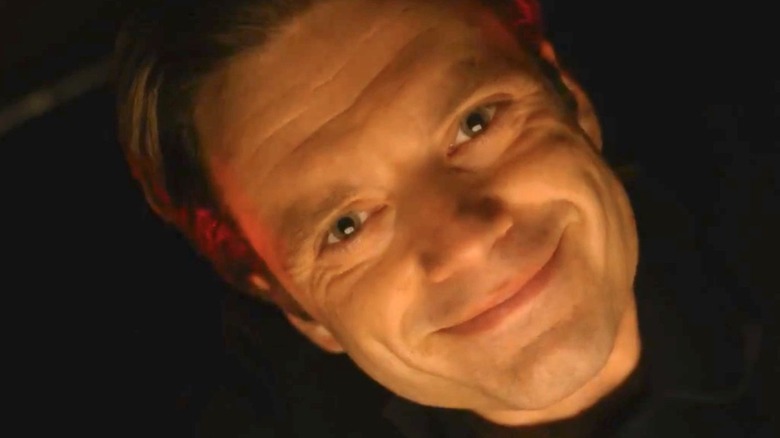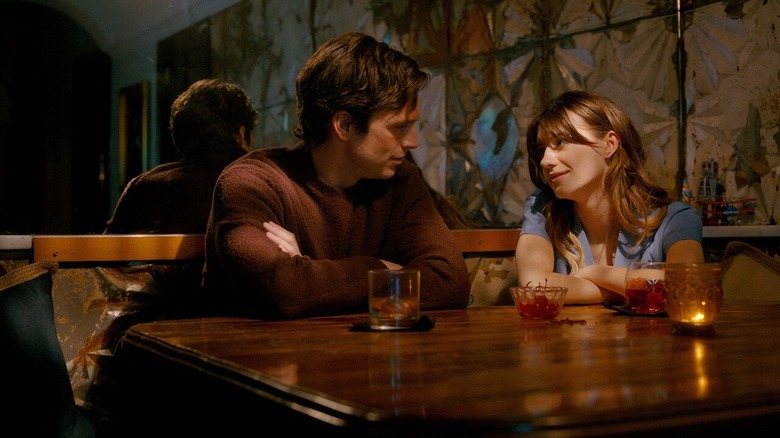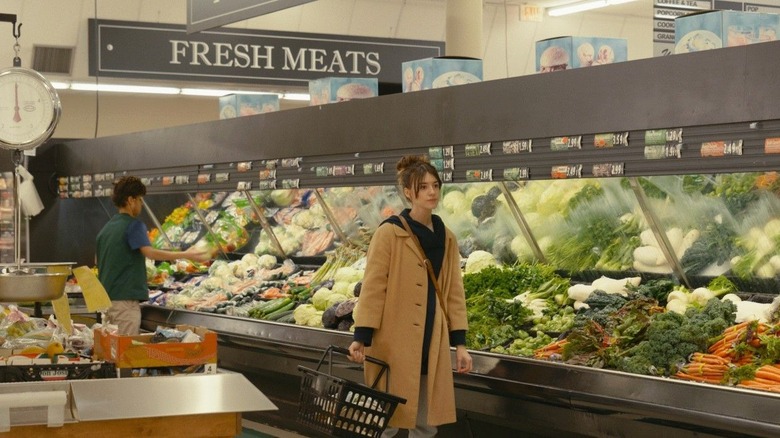Fresh Review: Tired Cannibal Horror That's Anything But
In the Rotten Tomatoes era, naming your movie "Fresh" gives critics an easy job when it comes round to reviewing it; regardless of whether it lives up to its title, or is declared to instead be rotten with a self-satisfied smirk by the critic at hand, the pull quotes easily write themselves. For this exact same reason, it's also crucial that a film released under this title features a distinctly original narrative — and to its credit, the directorial debut of Mimi Cave certainly appears to have a fresh genre hook upon first glance.
This is a dark dating satire that uses cannibalism as an allegory for the dehumanizing process of endlessly swiping right, having to suffer through an endless buffet of terrible romantic prospects, determined entirely through an algorithm created by men. But as the film progresses, this metaphor eventually becomes stale. Even as it gets increasingly gruesome, it never evolves beyond this sole nihilistic observation about the modern dating experience for women, constantly hitting the same note despite the plethora of twists and turns.
Swipe left
The introductory scene might be the film's standout. We're introduced to Noa (Daisy Edgar-Jones, star of Hulu's "Normal People") in the midst of an awkward date so believably written it will likely make viewers' skin crawl more than any of the visceral gore that follows. With no prior warning, her already badly matched date segues into a borderline Fox News talking point about how women are no longer as "feminine" as they used to be — and so the date abruptly ends, and Noa is thrown back into the apps to try find anybody with anything to offer that's more substantial than a crudely taken picture.
In the cold light of day she meets Steve (Sebastian Stan), a charming plastic surgeon she has a meet-cute with in the middle of a grocery store. He's old fashioned (he doesn't even have an Instagram!), but takes her number, and soon the pair embark on a courtship where his many red flags are obvious, but she's too smitten with someone who seems at the very least decent on the surface to care. It's within these early stages that both actors are at their strongest, forging a believably awkward chemistry for their early date sequences, playing off each other incredibly well as two guarded people keeping their deeper intentions at bay. One is withdrawn after a succession of bad dates, while the other has to over emphasize a romantic façade to win her over. As a parody of stereotypical heterosexual dating dynamics, where men increase the charm on their earliest dates to hide a toxic personality, you can't really get less subtle than this.
The opening half hour chronicles this early stage of their relationship before they embark upon a getaway, and the real reason for their courtship is brought painfully out into the open. As the opening title card belatedly drops at the 30-minute mark, Cave's film announces that everything up until this point was merely prologue — and unfortunately, the blackly comic thriller it subsequently comes is devoid of anything in the way of surprises. The specific way "Fresh" functions as a cannibal story I'll keep quiet for the sake of spoilers (to the credit of screenwriter Lauryn Kahn, it's a little more imaginative than having Steve be revealed to simply want to eat human flesh), but to say this reveal in and of itself is a spoiler is particularly insulting to the audience's intelligence. From the opening date, as Cave's camera lingers on bad food, right down to the fact the film is called "Fresh," it's hard to think of a recent narrative reveal that has been more heavily signposted. Unfortunately, as the story progresses in an obvious way, its wider allegory for the modern dating experience doesn't develop alongside it.
Not enough food for thought
Due to the specific comedic tone Cave is striving for, combined with the weightiness of the subject matter, I was frequently reminded of "Promising Young Woman," another film that proved divisive in the way it struggled to reconcile its stylish ultraviolence with themes many believed needed handling with less irreverence. I fell in between the two sharply divided camps on that film, feeling it wobbled because it was dealing with too many weighty issues, only managing to scratch the surface of any of them within a revenge thriller context.
"Fresh" has the opposite problem, having a more streamlined narrative approach to tackling toxic masculinity, but to the extent that it simplifies the issue too much, ensuring that nothing within its central thesis can get lost beyond the copious amounts of bloodshed. Misogyny is, after all, a subject that has been handled effectively in several brilliant genre movies over the years — but when placed within a cannibal story, it often feels that Cave and Kahn are lacking bite in their approach. Their ideas remain simple, so as to not overwhelm the effectiveness of the horror beats. Say what you like about the effectiveness of "Promising Young Woman," but there's something commendable about its refusal to play things safe in that regard.
As the story continues, Noa's best friend Mollie (Jojo T. Gibbs) embarks upon an investigation to discover where her friend went missing, with her amateur sleuthing unveiling an even bigger conspiracy which she subsequently falls into. Again, this doesn't advance any of the ideas about men abusing their positions of power, but it does lead the film towards a third act where Stan's performance becomes too overtly cartoonish for any of its ideas to land in the way they should — a villain so outsized, he makes Edgar-Jones' more restrained and gradually transformational performance suffer just by having to share scenes with him. This is, of course, a heightened satire, but the concepts Cave is dealing with should never start to feel like purely outlandish threats instead of an allegorical social commentary.
When viewed purely as the latest entry in the cannibal horror subgenre, the film similarly misses the mark, fixating on overused visual signifiers (lingering shots of slabs of meat, for example) that strip the conceit of any novelty. When placed next to a recent film like "Raw," Julia Ducournau's excellent debut about two sisters coming to terms with their cannibalism, the lack of unique, visceral thrills is just as apparent as the lack of anything new to say. There might be plenty to enjoy on the surface here — but why settle for surface-level thrills when other films can give you more to chew on?


